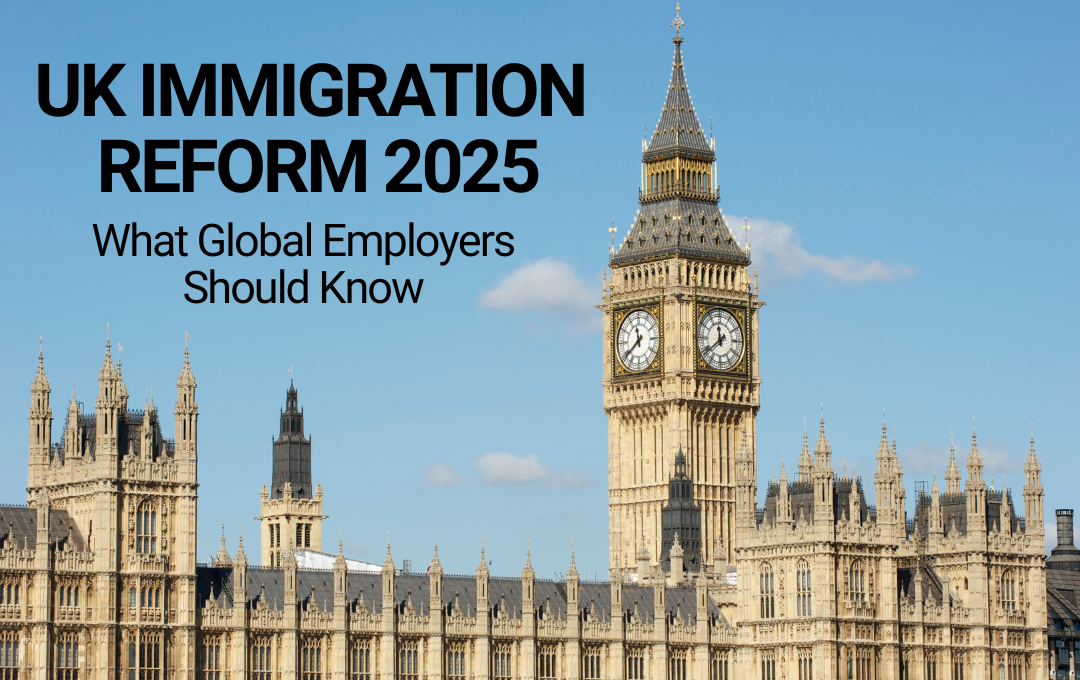How to Pay International Employees in USA?
Discover how to pay international employees legally and efficiently in the US. Compare EOR, global payroll, and contractor solutions.

In May 2025, the UK government published its landmark white paper titled Restoring Control over the Immigration System, heralding a new era of tightly regulated immigration policy. The reforms include: raising the Skilled Worker visa threshold back to RQF Level 6 (graduate‑level jobs only), abolishing the discounted Immigration Salary List, shortening the graduate post‑study visa from 24 to 18 months, doubling the path to Indefinite Leave to Remain (settlement) from five to ten years, and imposing higher English language requirements across both main applicants and adult dependents—culminating in B2 proficiency for settlement.
These changes are rooted in five core policy objectives set out by the British government:
Compared with rules before 2025, the contrast is stark: the previous post‑Brexit points‑based system (introduced in 2020) had lowered the Skilled Worker threshold to RQF 3, allowed discounts via shortage occupation lists, permitted two‑year graduate stays, and enabled settlement after five years.
In contrast, the new regime reverses these liberalisations—removing access to low‑level occupations (except on a temporary, limited basis), eliminating salary discounts, shortening student pathways, and significantly tightening routes to permanent residence and family migration.
See the complete comparison chart before and after the changes to the UK work visa rules:
To learn more about the UK Immigration Reform, visit the official website Gov.uk for more updates.
The UK’s 2025 immigration reform marks a major shift in how skilled migration is managed, with far-reaching consequences for employers and prospective workers alike. Among the most significant changes is a complete overhaul of the Skilled Worker visa route, which now imposes stricter salary thresholds, tighter job eligibility criteria, and more limited sponsorship options.
According to the British immigration policy, the minimum annual salary thresholds for UK skilled worker visa applications will rise from £38,700 to £41,700. And for recent graduates or under‑26 applicants, the floor increases from £30,960 to £33,400.
In addition, eligibility for UK skilled work visas will be restricted to positions requiring degree-level qualifications. All of these indicate the UK’s determination on raising a higher bar for global talents and reduce reliance on low-skilled workers.
A tougher English language requirement has been confirmed as well. All skilled workers will be asked to demonstrate proof of English proficiency level to CEFR Level B2 (upper-intermediate). More importantly, English language requirements will be introduced for dependent partners for the first time.
For a UK sponsor license, the Immigration Skills Charge will rise by 32%, adding an extra £320 per year of sponsorship for medium or large employers. This significant increase will further drive up the total cost of securing a UK work visa, placing additional financial pressure on businesses seeking to hire from overseas.
During the transitional stage, Skilled Worker visa holders in RQF Levels 3–5 roles (granted before 22 July 2025) to extend or change jobs until at least 22 July 2028, after which the protections may end. Approximately 180 mid‑skill occupations previously eligible at RQF Levels 3–5 are now excluded unless included on a Temporary Shortage List (TSL).
The Temporary Shortage List (TSL) is a new list introduced by the UK Government in July 2025 to replace the old Immigration Salary List. Roles listed on TSL must meet labour shortage criteria and are time-limited, typically without dependent rights.
Another important note is that the Adult Social Care visa will be closed to new applicants from overseas. However, holders who are already being sponsored for a social care visa before the implementation date (Jul 22, 2025) will not be affected.
As of 2025, the UK government has identified a select group of high-demand occupations eligible for temporary sponsorship under the Temporary Shortage List (TSL)—a key feature of the new immigration reform. These roles, although no longer part of the standard Skilled Worker route due to tightened eligibility (now requiring RQF Level 6 or above), are considered essential to addressing immediate labour market gaps. Notably, these positions remain eligible for a limited period and come with stricter conditions, such as no dependent visas and stricter compliance.
These roles, primarily at RQF Levels 3–5, will remain on the Temporary Shortage List until late 2026, with the expectation that employers develop local workforce pipelines in the meantime. This transitional mechanism supports industries facing acute shortages while aligning long-term immigration with the domestic skills strategy.
The 2025 immigration reform introduces stricter oversight for UK employers sponsoring foreign workers, significantly raising the stakes for compliance. Employers must now ensure that all sponsored roles meet RQF Level 6 requirements and updated salary thresholds, with any deviation risking license suspension or revocation. The reforms also impose tighter record-keeping, right-to-work checks, and ongoing reporting duties—intended to reinforce the government's crackdown on misuse of the visa system.
Additionally, updates to the sponsorship license regime include increased scrutiny at the renewal stage and more frequent compliance audits. Employers must demonstrate not only role eligibility but also a genuine need for overseas talent and efforts to recruit domestically.
Failure to comply comes with harsher consequences:
For more information on hiring in the UK, please refer to Slasify’s UK employment guide.
For international job seekers, the 2025 reforms significantly narrow the pathways into the UK labour market. The points-based system now imposes higher barriers, especially for those applying under the UK Skilled Worker visa. Applicants must secure a job at RQF Level 6 or above, meet raised salary thresholds (e.g. £41,700), and demonstrate B2-level English proficiency for longer-term settlement. Lower-skilled roles (RQF Levels 3–5), which previously offered viable entry points, are largely excluded—unless temporarily listed under the Temporary Shortage List, and even then, these come with restrictions such as no dependent rights or limited visa duration.
While the Skilled Worker route becomes more selective, alternative visas still offer limited opportunities:
In short, job seekers now face a more competitive, skills-focused landscape, where long-term opportunities increasingly favour highly qualified professionals in strategic sectors. Those without a clear alignment to UK labour market priorities may need to explore alternative destinations or pursue further education or upskilling to remain eligible.

The UK’s immigration overhaul brings major changes to the sponsorship system, job eligibility, and visa costs—requiring employers to act quickly to stay compliant and competitive.
With the new UK Immigration Rule taking place, global employers may encounter more barriers in regards to cross-border payments, compliance with local law, as well as employee data privacy. Slasify’s Employer of Record (EOR) and Global Payroll Solutions offer organization a hassle-free, streamlined talent onboarding and scalable payroll solutions without breaking the bank.
Read our complete guide for UK employment to get started today. You can also learn more about our solutions and find the right fit for your business.

To obtain or update your UK Sponsor License, here are a list of tasks you need to do to be compliant with the 2025 new UK immigration rules:

A1: If you already live in the UK on a skilled worker visa, this will stay the same. You will be able to extend your visa based on your current job.
A2: Currently, there haven’t been any new changes to the Family visa. If you’re in the UK on a family visa, you can only apply for indefinite leave to remain after living in the UK for 5 years. This policy is not expected to change in the near future.
A3: The Graduate visa route will remain available, enabling international students who complete a UK degree to stay in the country while they search for work. If you’re already on a Graduate visa, the new rules will not affect you. However, newly applied Graduate Visa holders are permitted to stay just 18 months under the new rules. Notably, PhD holders—who currently enjoy a three-year post-study visa—will also be limited to 18 months, aligning them with bachelor’s and master’s degree graduates under the new rules.
A4: Yes, they can. However, under the new rule, employers need to adapt by implementing strategic workforce planning, investing in employee training, and refining international recruitment approaches to align with the revised immigration framework.
A5: Under the new regulations, UK Skilled Worker visa decisions generally follow similar timelines to those before 2025,~3 weeks for overseas applicants and ~8 weeks for in-country cases, with available fast-track options bringing decisions in as little as one working day. While many cases close quickly, complex or high-volume periods can significantly lengthen timelines.

In 2025, as UK immigration rules raise the bar for sponsorship, compliance, and visa eligibility, navigating the new landscape can be overwhelming—especially for companies without in-house legal or HR teams. That’s where Slasify comes in. Slasify empowers businesses to confidently expand into the UK with end-to-end support across global hiring, compliance, and workforce management.

Founded in 2016 in Taiwan and now headquartered in Singapore, Slasify began with a vision. We saw the rapid expansion of businesses outpacing traditional work models. Inspired by the rise of the internet and the growing demand for flexibility, our founders created Slasify to bridge the gap between global businesses and remote talent. What started as a small team with a big dream has grown into a global powerhouse. Today, Slasify serves over 150 countries and operates in 130 currencies, empowering businesses to expand without borders. Read more!
Discover how to pay international employees legally and efficiently in the US. Compare EOR, global payroll, and contractor solutions.
Borderless work in 2026: Learn how companies hire globally, navigate compliance and payroll challenges, and streamline international employment.
Expanding globally? Use this 2026 payroll and work visa checklist for U.S. companies and see how Slasify simplifies compliant hiring worldwide.
Stay on top of the global hiring trends and regional compliance updates with Slasify.